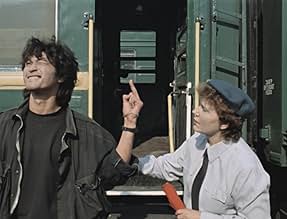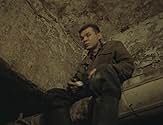Moro is with Dina out near where the Aral seashore used to be. He notices scorpions on the ground. He sits above them, gathering them into a jar, and tells Dina that he never saw scorpions there (Kazakhstan) 3 years before. Is he simply talking nonsense, or is he speaking about the return of the Kazakh people, or is he speaking of the failures of the Soviet Union, which took away Kazakh identity in exchange for (failed) modernization?
I am a huge fan of the band KINO (I remember first hearing their work in the mid-80s). I sat down with the director, Nugmanov, who is a great person. I have also seen "The Wild East." I love foreign cinema. Does this mean that my review is biased? Yes, to a point....
"The Needle" (only available on DVD either non-subtitled from Russia or in PAL format with multi-subtitles from Sweden), is "one of those movies for those who were fans of Tsoi." You'll read this over and over and over again! However, by only taking that position, one doesn't understand the HISTORIC importance of a band like KINO or a movie of this type.
Once upon a time, there was a place called the USSR. There was no allowance for individual expression, nor was there any films that were outside of State ideology. There was no drug use there. There were no gangs or blackmarket. That's how it was. Right??? NO. For one, Tsoi was extremely popular, and his lyrics were beautiful and poetic, and his music illegal. Movies that never existed (in the eyes of the State) somehow did exist ("The Kommissar," "Benya Krik," "Color of Pomegranates"). The Soviet Union had its problems, just like every country. When you think "Vodka," what country pops into one's head? It was great to be the state and control EVERY aspect of one's life for Socialism.
However, there were some great break-away filmmakers that wanted more, regardless of what SSR they originated. Tarkovsky was one (he went into self-exile), Paradjanov was "crucified" by authorities, but others, like Romm, were able to toe that fine line. How some other movies passed while others didn't is well worth analyzing. Nugmanov, who was best friends with Tsoi, made this sole feature that starred the late rock star. Because of this, Nugmanov's "Igla" and "The Far East" shall go down into history books as significant to the study of the Soviet Union (and glasnost), film, and music (and the Kazakh New Wave cinema movement). These movies were made in the waning years of the Soviet Union...
The movie is nearly a type of "commercial" vehicle for Tsoi, but it is also a "slap in the face" to the socialist regime that attempted to squelch free speech. Note the huge ship in the middle of a dried-up sea (I believe the Aral). The Kazakh people, like Nugmanov, definitely saw that their country was destroyed by socialist policy. Like the Indians in North America with alcohol abuse, drug abuse was a way of life in the SSR, but not allowed to be shown. There is no happiness through socialist realism. In reality, the SSR is barren, overcast, seedy, and sad. That it the way Nugmanov showed it, and he enjoyed placing Tsoi as the lead in it. There are other great characters (and acting) in the movie, most notable is Dina (Smirnova) and Spartak (Bashirov).
Oh, and the movie is about drug abuse and failed policy, but also about the coolness of Tsoi. But the "needle" could refer to the feel-good socialist realism that is like a drug by the State to distance or hide people from the reality of life. It can also be Nugmanov using film as a needle to inject the audience with a bit of reality.
Note how scenes of the movie begin and end with television programs. Try to "read" that!
It's not an entirely original plot, but it sure is a good movie, even with its ambiguities (like, why has Tsoi returned and who is he?). Decent film compositions, use of acting talent, and, yes, music by KINO!
9 of 10. ------- E.






















